Dear Hivers,
Perhaps one of the most in-depth yet important SEO topic is keyword research. And in this post, I want to simplify it for every Hive user.

Before we go there, let us take a step back and see what we have published so far. First, we started with the SEO introduction two weeks ago.
And then, last week, we discussed the importance of titles and URL structure. I would like to take a moment to summarise this because everything is linked together.
First, we talked about titles (also called as headlines) and they are important for two reasons:
- It indicates what the page is all about
- It helps your followers (and search engine)
Then we saw why short URLs are equally important:
- Short URLs are easier to remember and share on social media.
- A short URL tells the search engine about the topic.
- A short URL improves the user experience.
We also discussed what to avoid:
- Do not use excessive words in the URL
- Do not use a generic term (page1) in the URL.
After this, we saw lots of examples followed by two simple exercises. And now, we move onto keyword research and how to go about it.
The Keyword Research Method
I am a huge fan of keeping it simple. So let’s not complicate keyword research. Because one can write dozens of pages explaining the process.
The worst part is: No one will implement it.
That is why I am keeping it simple. I want each and everyone to understand the basics in a new way. I have personally used this method for years to write hundreds of articles.
The technique to efficient keyword research is simple as shown in this image:
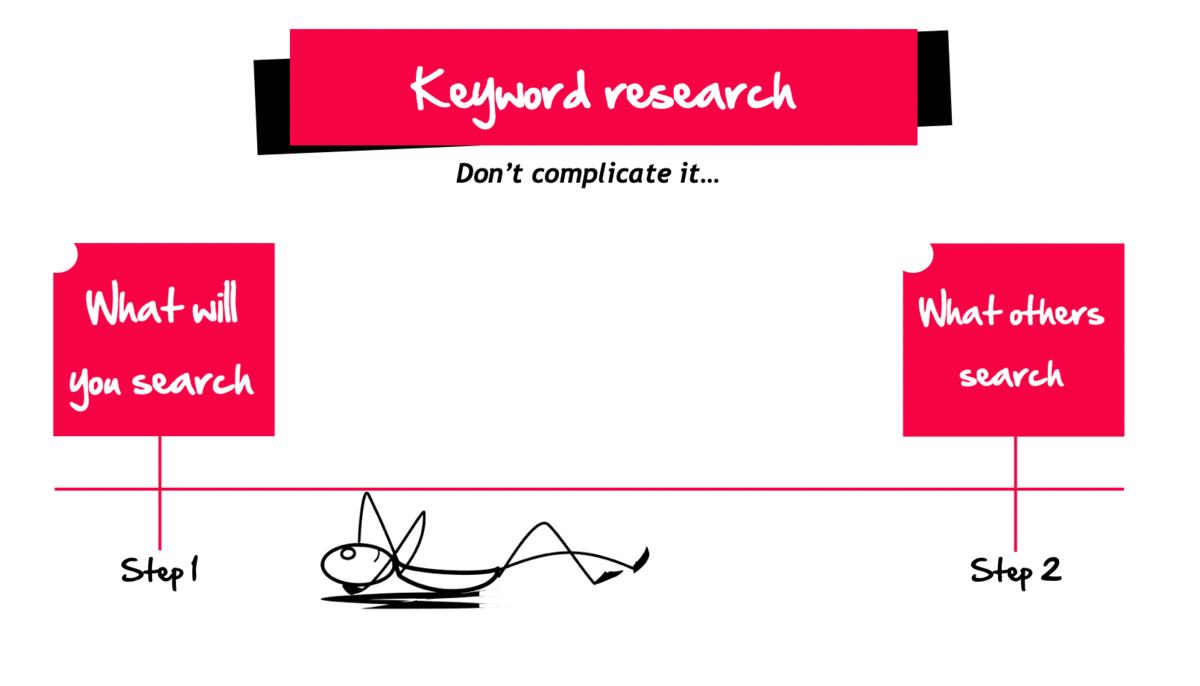
I will explain more about this method soon. First, for those who are curious, and don’t know what keyword research really is…
It simply means this:
You are going to add “useful” keywords into your Hive posts. When you do that, your articles will rank higher on search engines.
And that means more traffic — you grow — the platform grows — and all us grow together. Simple, right?

And with this, let us explore the two keyword steps and see how to use them in your next Hive posts.
As you can see from the image below, your mission is to slide from step 1 to step 2. In simple words, you start with step 1 and then move onto the step 2.

And when you complete both, you are done with the "research" part. So let's dive into each step.
Step 1: What will you search
Ask yourself: What will you search in Google?
Every time you go to Google search engine, you are typing something. And this “something” are the keywords.
They come from your mind — and they belong to you. So, as you think about it, these are internal keywords you have created.
The idea is simple:
- Write down everything you are going to search
(You may want to read this)
Example: Suppose I am planning to write about books to read around blockchain. In my mind, I am thinking of these words that I will type in Google:
- Best books on blockchain
- Cheap books on blockchain
- Free blockchain books…
And so on.
I open a document and save these keywords. For example: The topic is "blockchain books" and "my search" are the keywords I thought about:
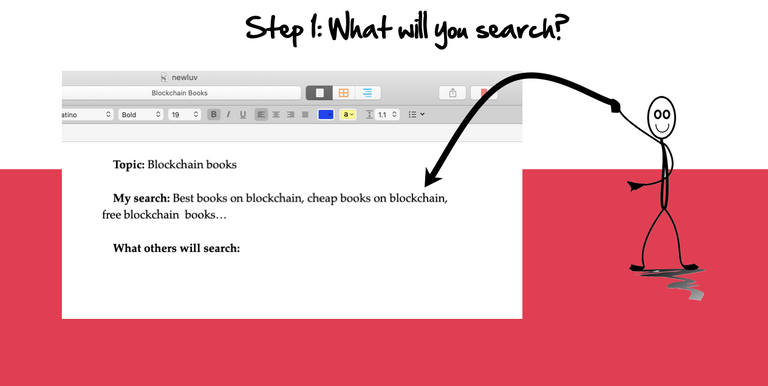
What if you can’t think of anything? That’s alright. You simply have to write down the possible phrases and words you believe people will search. Think what your friend will search, for example.
Even if it is one keyword, that’s okay. Add that in the document.
Step 2: What Others Will Search
Ask yourself: What will other people search on Google?
In the earlier days, to know intentions and feelings, you have to ask better questions. Now you don’t have to do that anymore.
Because Google search engine has all the data. You can simply run a keyword research.
There are dozens of keyword tools out there and I don’t want to overwhelm you. Some requires sign up, and so I have excluded them. You really need one or two tools.
Few of them are:
- Keyword.io
- KeywordPro
- Ubersuggest (may ask for login)
- Questiondb
- Keywordtool.io (limited)
How to use them?
Coming back to our example of blockchain books, I am going to pick a tool and do some keyword research. For example: I will use Keyword.io (#1 tool) and type the keyword "blockchain books."
I get back these results. I scan through them.
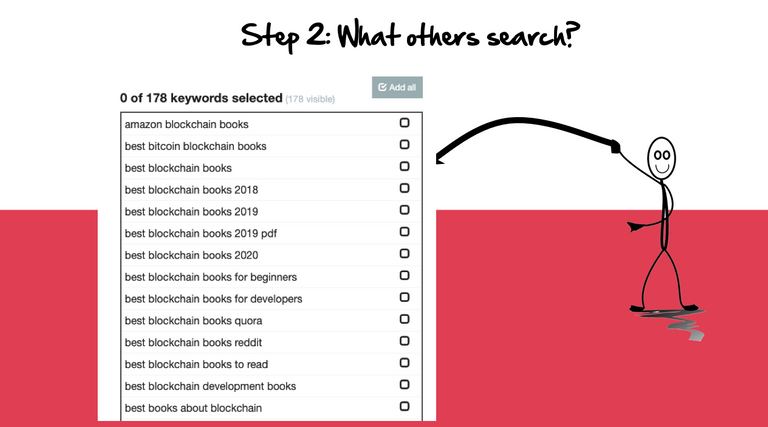
Then I pick a couple of them and save them in my document. Do note that each keyword has certain volume (searches) which we will discuss in the future.
For now, you are going to save the keywords in your document and then move onto the last step.
Last Step: The Final Edit
You see what we did so far.
First, we took the keywords that were inside our head — and then took the words that were outside using keyword research tools.
Now we combine them to get our final document:
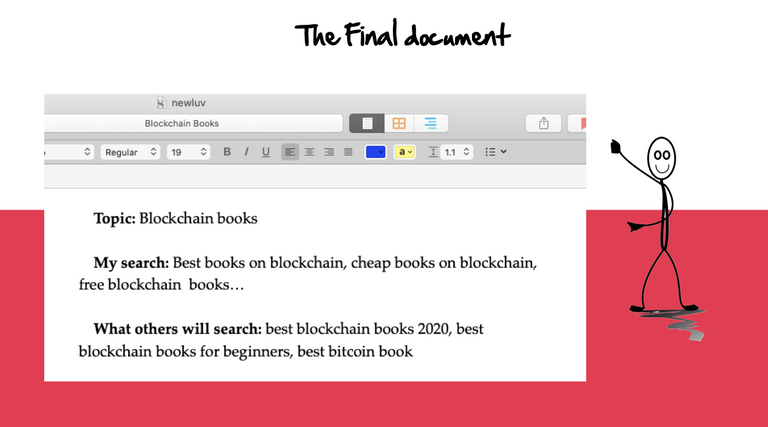
As you can see, you have the topic — your keywords — and the keywords you extracted. All of them together in the document.
With this, you begin your keyword writing process. In simple words, you start writing.
The Keyword Writing Process
Only 3 simple steps: you start by writing your headline, and then your content, and finish the article by adding keywords.
Here are the 3 steps:
Step 1. Start rewriting your headline
Step 2. Write your content
Step 3. Sprinkle the keywords
This is how the process looks like:
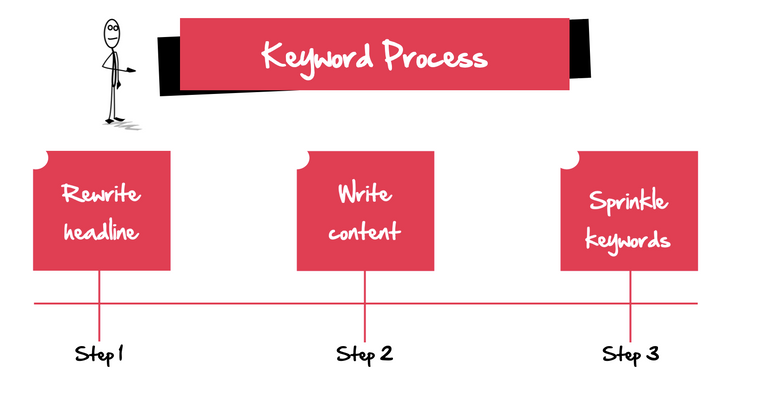
For example:
Rewrite headline. Based on the keywords, the title will be: Top 10 Blockchain Books In 2020
Write content. You continue writing as you would normally do. In fact, once the headline is created, it gets easier to start writing.
Sprinkle keywords. As you are writing, start sprinkling the keywords you have saved.
Where to sprinkle? In your introduction — in your subheaders — in your new paragraphs — in your footer.
Note: Always make your keywords look natural. As always, you should always write for your readers!
With this, here is the final sample article. You can see I have sprinkled keywords in the introduction (keywords underlined):
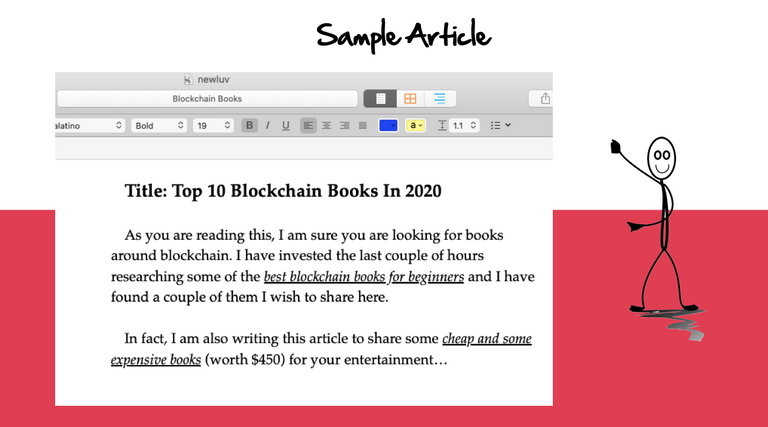
This Week’s SEO Exercise
As a summary, we looked into the keywords and its importance. Next, we saw two steps to make keyword research easier.
Then we also saw how to actually find keywords — from your mind and then from keyword research tools.
And then, finally we saw the entire process of writing. With this, let us do an exercise:
Exercise: Perform Keyword Research
#1: Pick a topic
#2: Do a keyword research
#3: Write the article
#4: Change the headline
#5: Sprinkle keyword
And with this, we end today's lesson. I hope and wish you are finding these SEO tutorials useful. If there's any question, feel free to ask them by leaving your comments below. As usual, I always appreciate your support. 🔥
Cheers,
Sid
Liked this article? Feel free to comment and upvote and reblog.
Great post - it would be awesome to see hive posts found in search :-)
Oh yes. We are ranking. Peakd pages are ranking higher now. Good times are here. 😃
Thats so cool to hear, nice!!!!
I missed this post in my feed, thanks to twitter I could take my daily dose :)
An "AWESOME" mate AWESOME post. Thank you for informing us 😌
Daily dose? 😌
Haha! You are always so supportive. Thank you!
I'll bookmark this for later,
SEO is my least favourite game I'm forced to play.
@tipu curate
Upvoted 👌 (Mana: 14/28)
Forced!
I would love to know why.
My main blog which I live off - https://revisesociology.com/
The stagnating stats
I'm less worried about this year, that's mainly due to the exams being cancelled, I think overall the attention I've paid to SEO has improved things a little.
It's a chore though - with hundreds of posts and pages now to manage as well as new material to produce.
Great. Going through the site — perfect. A lot of people focus only on SEO and don't write naturally. It ruins the entire reading experience. You have the opposite problem (good content - and less focus on SEO). And that's great.
The above method - to "sprinkle" keywords should be good enough. Other than that, as I quickly glance:
I have shared this post on Twitter - what fun! #posh
Cheers for the helpful post as always, mate. I've personally not taken much of a focus on keywords for SEO, which isn't ideal. There was a time when I'd use the same method of what I, and others would want to search. I'd punch the keywords into Google Trends, and individually I'd find synonyms to those words that would rank higher. I haven't tried any of the other keyword sites, and to be honest, I haven't much bothered.
As revisesociology said, it's quite a chore. For better or worse, I've always titled posts with some reference, inside joke, or for (ahem) artistic expression. It's fun, but as a result, SEO hasn't been a focus on my end. Though perhaps it's a good time for me to start reopening my chapter with SEO, eh?
Good point. Hence, rather than elaborating on in-depth gazillion methods, I used a simple technique. Exactly like what you said - perhaps use Google trends, pick up some variation, and go writing.
SEO is an optimization game. Good content comes first. Then optimization. Keep your SEO book open though. No harm in learning and implementing.
Cheers for the advice, mate! It's those little things like SEO, or putting a good thumbnail that'll certainly attracts people's needy eyes. I'll definitely try to push more SEO into my posting habits, and hey, if it gets Hive up the rankings, it's all the better :-D
Nice, helpful and informative article.
Any books/videos you recommend to learn more about SEO? :)
Congratulations @sidwrites! You have completed the following achievement on the Hive blockchain and have been rewarded with new badge(s) :
<table><tr><td><img src="https://images.hive.blog/60x70/http://hivebuzz.me/@sidwrites/replies.png?202006240940" /><td>You got more than 3000 replies. Your next target is to reach 3250 replies. <p dir="auto"><sub><em>You can view <a href="https://hivebuzz.me/@sidwrites" target="_blank" rel="noreferrer noopener" title="This link will take you away from hive.blog" class="external_link">your badges on your board And compare to others on the <a href="https://hivebuzz.me/ranking" target="_blank" rel="noreferrer noopener" title="This link will take you away from hive.blog" class="external_link">Ranking<br /> <sub><em>If you no longer want to receive notifications, reply to this comment with the word <code>STOP <p dir="auto">To support your work, I also upvoted your post! <p dir="auto"><strong><span>Do not miss the last post from <a href="/@hivebuzz">@hivebuzz: <table><tr><td><a href="/hivebuzz/@hivebuzz/farewell-lizziesworld"><img src="https://images.hive.blog/64x128/https://files.peakd.com/file/peakd-hive/hivebuzz/MdTLbKWz-cover.png" /><td><a href="/hivebuzz/@hivebuzz/farewell-lizziesworld">The Hive community is in mourning. Farewell @lizziesworld! <h6>Support the HiveBuzz project. <a href="https://hivesigner.com/sign/update_proposal_votes?proposal_ids=%5B%22109%22%5D&approve=true" target="_blank" rel="noreferrer noopener" title="This link will take you away from hive.blog" class="external_link">Vote for <a href="https://peakd.com/me/proposals/109" target="_blank" rel="noreferrer noopener" title="This link will take you away from hive.blog" class="external_link">our proposal!Really useful this article. I know that SEO is important, but I never put it into practice, it seems too much work. But you make it look simple with this publication. I thank you for teaching us. It's the first time I visit your blog.
Greetings from Venezuela.
Again - a very useful piece.
A great write up, it shows deep insights with pictures.
Thank you!
I've read tons of articles in search of what actually SEO dudes do and man, this is by far the best of them! You sir, have a knack for teaching.
Hi! This is my first comment here so I just wanted to give a quick shout out and say I genuinely enjoy reading your blog posts. Can you recommend any other Best Keyword research tools for SEO blogs that go over the same topics?
Thanks a ton!